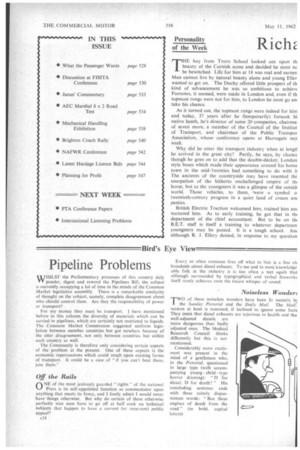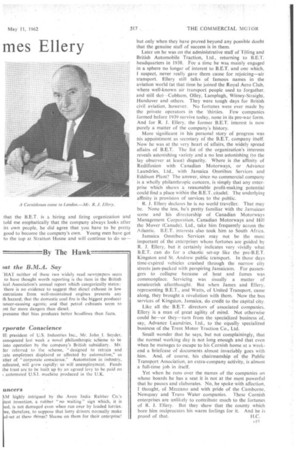Bird's Eye View By The Hawk tat the B.M.A. Say
Page 20

Page 21

If you've noticed an error in this article please click here to report it so we can fix it.
Pipeline Problems
WHILST the Parliamentary processes of this country duly IV ponder, digest and reword the Pipelines Bill, the subject is currently occupying a lot of time in the minds of the Common Market legislative assembly. There is a remarkable similarity of thought on the subject, namely, complete disagreement about who should control them. Are they the responsibility of power or transport? For my money they must be transport. I have mentioned before in this column the diversity of materials which can be carried in pipelines, which are certainly not restricted to liquids. The Common Market Commission suggested uniform legislation between member countries but got nowhere because of the utter disagreement, not only between countries but within each country as well. The Community is therefore only considering certain aspects of the problem at the present. One of these aspects is the economic repercussions which could result upon existing forms of transport. It could be a case of "if you can't beat them, join them.
Off the Rails.
0 NE of the most jealously guarded " rights " of the national Press is its self-appointed function as commentator upon anything that meets its fancy, and I freely admit I would never have things otherwise. But why do certain of these otherwise perfectly nice men have to go off at half cock on technical subjects that happen to have a current (or recurrent) public appeal?
A I 8 Every so often someone fires off what to him is a fine oh broadside about diesel exhaust. To me and to most knowledge able folk in the industry it is too often a wet squib that although surrounded by typographical and verbal fireworks itself rarely achieves even the tiniest whisper of sound.
Noiseless Wonder
TWO of these noiseless wonders have been lit recently
the Sunday Pictorial and the Daily Mail. The Mail'. version at least is reasoned, if inclined to ignore some facts They insist that diesel exhausts are injurious to health and tha well-adjusted diesels. are more dangerous than badly adjusted ones. The Medical Research Council thinks differently but this is not mentioned.
Considerably more excitement was present in the mind of a gentleman who, in the Pictorial, questioned in large type (with accompanying young child type horror drawing): "D for diesel, D for death? " His concluding sentence ends with these calmly dispassionate words: "Ban these engines of death from the road" (in bold, capital letters)
'HAT neither of these two widely read newspapers seem to have thought worth reporting is the item in the British ical Association's annual report which categorically states: there is no evidence to suggest that diesel exhaust in low entrations from well-maintained engines presents any th hazard; that the domestic coal fire is the biggest producer ancer-causing agents; and that petrol exhausts seem to :.nt far more dangers than diesel.
Presume that bias produces better headlines than facts.
rporate Conscience
1E president of U.S. Industries Inc., Mr. John I. Snyder, Innounced last week a novel philanthropic sch‘eme to be into operation by the company's British subsidiary. Mr. Jer referred to the scheme, " designed to retrain and r...ate employees displaced or affected by automation," as ktter of " corpnrate conscience." Automation in industry, ndicated, will grow rapidly: so will unemployment. Funds the trust are to be built up by an agreed levy to be paid on i automated U.S.!. machine produced in the U.K.
uncers
M highly intrigued by the Avon India Rubber Co.'s test invention, a rubber "no waiting" sign which, it is ed, is not damaged even when run over by loaded lorries. we, therefore, to suppose that lorry drivers normally make d-set at these things? Shame on them for their enterprisel




































































































